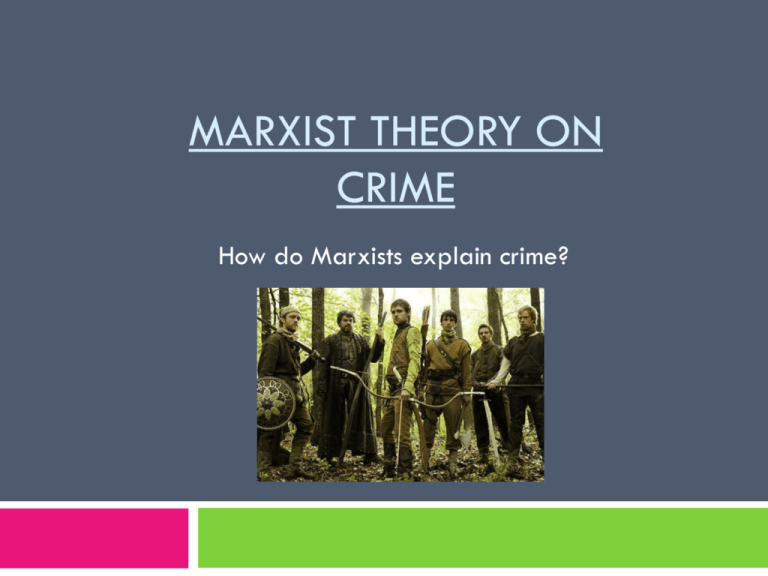Marxist theory on crime
advertisement

MARXIST THEORY ON CRIME How do Marxists explain crime? Connector 1. 2. 3. 4. 5. In pairs, discuss: Who was Robin Hood? Who did he steal from? Why did he steal? How did the authorities try to deal with him? Do you think that today’s criminals are modern-day Robin Hoods? Objectives All to be able to outline the Marxist theory on crime by explaining why people commit crime using key concepts such as capitalism, materialism and consumerism. Most to be able to explain why the ruling class also commit crime, but get away with it while the working class get caught. Some to be able to identify the strengths and weaknesses of an essay on this topic. Marxist theory Ruling class Working class http://www.youtube.com/watch?v=0rCnkDs0B_ 8 Task 1 1. 2. 3. 4. 5. Work on your own to read the handout and answer these questions into your book using full sentences: Why is capitalism unfair? Why are the ruling class able to exploit the working class? How does capitalism create crime? According to Marxists, who breaks the law in society? Why are the ruling class able to get away with their crimes? Extension - Are criminals modern day Robin Hoods? Task 2 In pairs, read the statements and discuss: According to the Marxist theory, is this behaviour illegal? Who will get punished? Who will get away with their crime and why? Write down your thoughts about 2 of the statements into your book. A celeb has 200 pairs of shoes while a mother in Bradford cannot afford to buy her child a single pair. A police officer lets an owner of the local factory off with a warning, but fines one of the workers for the same speeding offence. A wealthy chief executive of a bank quits his job in order to avoid being arrested for fraudulent trading carried out by the bank’s traders. A teenager is arrested for stealing an iphone which all her friends have, but she couldn’t afford to buy one. Task 3 1. 2. 3. a) b) Work in pairs. Read the cards – each is a paragraph from an essay answer to this question: Discuss how far sociologists would agree that crime is caused by capitalism. (12 marks) Arrange the cards in the order in which you think they should be written up as a essay. Mark it by: Annotating each paragraph with around 3 things that are good about it. Annotating each paragraph with around 3 things that need to be improved. Correct order Intro: Marxist sociologists would agree that crime is caused by capitalism. However, other sociologists, such as Functionalists, would disagree. They say it is caused by the pursuit of the ‘American dream’ and membership of subcultures. P1: Marxists argue that capitalism causes crime. This is because it promotes materialism and consumerism (the ownerships and gain of material goods such as designer clothes) which, in turn, make people greedy and selfish. In addition, social institutions such as the media put pressure on people to want things they don’t really need by glamorising the lives of the rich and famous. As a result, people may turn to crime as the only way to get these things. Furthermore, Marxists argue that everyone breaks the law, even the rich. However, they get away with their crimes because they have the power to influence the government. Correct order P2: On the other hand, Functionalists disagree that capitalism causes crime. Merton argues that the pressure to achieve the American dream (success such as a nice house, car, etc. through education and work) may lead people into crime. This is because some people do not have the opportunity to become successful through legitimate means such as education so they turn to crime. Merton refers to these people as innovators and they tend to be working class. P3: Another Functionalist sociologist, Cohen, argues that membership of subcultures causes to crime. He says that young working class males can’t do well in education because education promotes middle class values which they do not understand. As a result, they lack status in school and develop status frustration (anger at their low position). In order to achieve status, they join gangs in which there is criminal behaviour such as truanting, drinking, vandalism, etc. Therefore, they learn to be criminal from the gang and in order to gain status. Conclusion: In conclusion, sociologists disagree on the causes of crime. While Marxists say crime is caused by capitalism because it creates greed, Functionalists disagree and say that it is the lack of opportunities of some people to achieve the American dream legitimately that leads them into crime as it leads them to join criminal subcultures. Good parts Outline of the essay in the Introduction – shows 2 sides of the argument. Defines the key words throughout the rest of the essay. Clear and correct structure – 1st part is the view that agrees with the title, then the opposing view. Correct use of connectives. Use of Sociologists’ names. Clear Conclusion. To improve Start the Intro by defining the key terms from the title (crime and capitalism). Too much detail on Marxism – the section about who gets punished is not directly relevant to this essay. Should have written a paragraph on biological explanations of crime as well. Task 4 Improve the essay by adding in the missing parts and crossing out the unnecessary parts. Learning journey Difference between crime and deviance, legal and illegal deviance Media representations of crime Official crime statistics – detecting, reporting and recording of crime, the dark figure of crime Social control (informal and formal) Explaining crime – labelling theory and subcultural theory How do Sociologists study crime: victim and self-reporting studies? Who breaks the law? – age, ethnicity and gender Explaining crime – Functionalist theory and Marxist theory Victims of crime, government solutions to crime, social problems of youth crime and racism Who breaks the law? – social class and locality Explaining crime – biological vs. sociological theories: peer group pressure, opportunity, socialisation Revision and end of Topic exam question Review Taboo Each student will come to the front of the class and pick a card. Each card has a key concept from this Unit on it. You have to describe the concept to the class so they can work out what it is.






